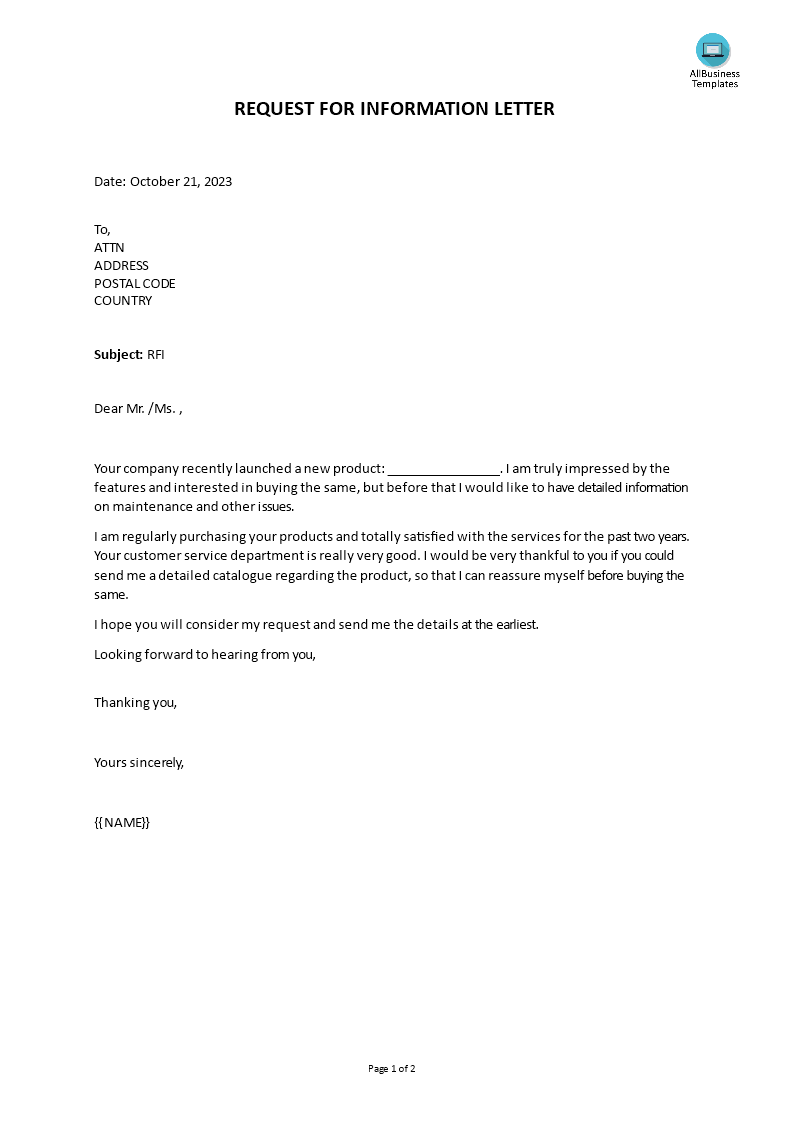Information Request Letter
Save, fill-In The Blanks, Print, Done!

Download Information Request Letter
Today: USD 1.49
Download It Now

Available premium file formats:
Microsoft Word (.docx)- This Document Has Been Certified by a Professional
- 100% customizable
- This is a digital download (24.24 kB)
- Language: English
- You will receive a link to download the file as soon as your payment goes through.
- We recommend downloading this file onto your computer.
Are you looking for a proper Information Request Letter? How does a letter requesting information work? What should I include in a letter of request for information? Our information request letter template can help you quickly and easily craft a professional letter to ask for information. It can be downloaded and easy to use. Try it today!
An information request letter is a formal written document used to seek specific information or details from an individual, organization, or entity. These letters are typically used in various professional, business, or personal contexts to request information that is not readily available or known to the requester. Information request letters should be clear, concise, and polite, and they may be used for a wide range of purposes, including:
- Business Inquiries: Companies may send information request letters to other businesses or suppliers to gather details about products, services, pricing, or terms of a potential business partnership or transaction.
- Job Applications: Job seekers might use information request letters to inquire about job openings, job descriptions, application processes, or interview schedules from potential employers.
- Research and Surveys: Researchers and academic institutions often send information request letters to individuals or organizations to request data, interviews, or participation in surveys or studies.
- Legal Matters: Attorneys may use information request letters as part of the legal process to request specific information or documents from individuals or entities relevant to a legal case.
- Government Inquiries: Government agencies may send information request letters to individuals or businesses to gather information for tax audits, investigations, or compliance checks.
- Personal Matters: Individuals may use information request letters for personal reasons, such as requesting records, documentation, or clarification on various matters.
Here are the key components typically included in an information request letter:
- Sender's Contact Information: Include your name, address, phone number, and email address at the top of the letter.
- Date: Add the date on which you are writing the letter.
- Recipient's Contact Information: Include the recipient's name, title (if known), organization, address, and any relevant contact details.
- Salutation: Address the recipient with a formal salutation, such as "Dear Mr. Smith" or "To Whom It May Concern."
- Introduction: Start with a brief introduction, stating the purpose of your letter and why you are requesting the information.
- Specific Request: Clearly and concisely state the information you are requesting. Be specific about what you need, and if applicable, provide context to help the recipient understand the importance of the request.
- Reason for the Request: Explain why you need the information and how it will be used. This can help build trust and increase the likelihood of a positive response.
- Additional Details: Include any relevant details or instructions, such as preferred delivery methods, deadlines, or reference numbers.
- Closing: Thank the recipient for their assistance and express appreciation for their prompt attention to your request.
- Signature: Sign the letter in ink if it is a physical letter. If it's an email, you can include a formal closing (e.g., "Sincerely") followed by your typed name.
- Enclosures: If you are requesting specific documents or information, mention any enclosures you have included with the letter.
- Contact Information: Provide your contact information again, in case the recipient needs to reach you for clarification or additional details.
- Follow-Up: Express your willingness to follow up or provide further information if needed.
Information request letters should be polite and professional in tone, and they should clearly communicate the purpose of the request while respecting the recipient's time and privacy.
DISCLAIMER
Nothing on this site shall be considered legal advice and no attorney-client relationship is established.
Leave a Reply. If you have any questions or remarks, feel free to post them below.
Related templates
Latest templates
Latest topics
- GDPR Compliance Templates
What do you need to become GDPR compliant? Are you looking for useful GDPR document templates to make you compliant? All these compliance documents will be available to download instantly... - Google Docs Templates
How to create documents in Google Docs? We provide Google Docs compatible template and these are the reasons why it's useful to work with Google Docs... - IT Security Standards Kit
What are IT Security Standards? Check out our collection of this newly updated IT Security Kit Standard templates, including policies, controls, processes, checklists, procedures and other documents. - Letter Format
How to format a letter? Here is a brief overview of common letter formats and templates in USA and UK and get inspirited immediately! - Google Sheets Templates
How to work with Google Sheets templates? Where to download useful Google Sheets templates? Check out our samples here.
cheese
